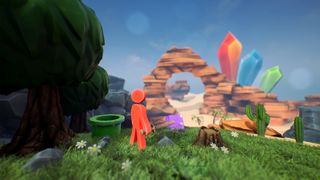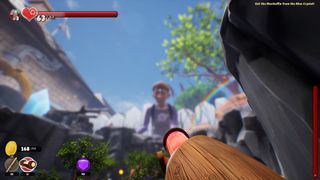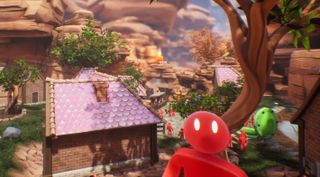How first-person metroidvania Supraland became a hit, and what's in store for the sequel
Developer David Münnich already has big plans for a Supraland 2.

It’s 2 pm in Germany, and David Münnich is ready for bed. His sleeping patterns have been "screwed up" for the past two decades, he tells me, and his working habits are equally erratic: sometimes he’ll work 20 hours straight, sometimes he’ll do nothing for a week and feel guilty about it. Currently he likes to work at night, when his kids are in bed and distractions are minimal, which is why he’s planning to sleep after our phone call in the middle of the afternoon.
I have no clue why everyone thinks their Metroidvania needs to be a sidescroller. Opening those 2D games up to 3D just makes it easier to create more interesting exploration.
David Münnich
It’s an unconventional approach to indie development, but then his latest project, Supraland, is an unconventional game—part puzzler, part point-and-click, part first-person shooter, all set in a Metroidvania version of a child’s sandbox. Münnich says he had zero expectations before last month’s release because "nobody cared about it" during Early Access. "I would’ve been happy if I got 2,000 people to buy it," he says. Now, it’s approaching 50,000 sales, and 96% of its 1,100 Steam reviews are positive.
It’s not hard to see why: Supraland is delightful. You play as a toy exploring a series of themed areas, each full of wonderful ideas. I watered seeds to make flowers grow, then arranged them to please a companion. I triple-jumped huge gaps, blasted skeletons, and summoned purple cubes to activate pressure plates. In my favourite puzzle, I dyed a wooden circle yellow and held it over another toy’s head so it looked like a halo, letting them charm their way into a chapel.
I did all this in the first few hours, and I know Supraland only gets wilder later on. It feels like an instant indie classic made by a large team—but Münnich made it alone in just 16 months. How did he pull it off? Where did he get the inspiration for a first-person Metroidvania? And is he working on a sequel? (Spoiler: yes, and it sounds exciting).
Münnich’s initial idea was as vague as they come: he wanted to make a first-person adventure game. "I'm fascinated by the ability to freely look around in first-person, find things, handle objects," he says. "In first-person, it’s me in that world instead of me controlling some dude in third person... they’re the only games that really immerse me."
To hone his plans, he played his favourite games and made a long list of everything he liked, before further narrowing them down to a few must-haves. That list, he says, gave him the "Supraland formula"—a first-person Metroidvania full of varied puzzles, which he wanted to feel as tactile as Portal's.
Supraland’s choice of perspective is unusual, and he kept searching the web for evidence of other first-person Metroidvanias, only to come up empty. But to him, it seemed like an "obvious combination. I have no clue why everyone thinks their Metroidvania needs to be a sidescroller. Opening those 2D games up to 3D just makes it easier to create more interesting exploration," he says.
The biggest gaming news, reviews and hardware deals
Keep up to date with the most important stories and the best deals, as picked by the PC Gamer team.
Map time
First-person meant Münnich could let players follow their natural curiosity without much guidance. You orient yourself by looking at the large objects in the distance, so when an NPC tells you that an important upgrade is hidden near a giant chair, you just need to glance at the horizon to know which direction to head. You never need a map, which Münnich says was a "central design decision."
"Maps might bring comfort, but they also degrade the entire 3D world to meaningless geometry," he argues. "I want people to always carefully look at their surroundings because this is where the immersion and satisfaction comes from."
His first step to designing the puzzles was to nail the abilities. He started with a list of 30 before whittling it down to only those that were versatile. "Unlike in a regular Metroidvania, where an ability can be used for one or maybe two things, I dismissed any ability that didn't at least have six completely different use cases," he explains. "So the magnet will not only allow you to climb metal things, but at some point you will be able to use it to erase a hard disk."

From those abilities—double jumps, air stomps, a gun that fires yellow blobs—he crafted his puzzles. The aim was to make it feel like "a point-and-click adventure, but better," and to reward experimentation.
"In the old school point-and-clicks... you would drag one object onto another and then hope the game would execute the solution. But most of the time it would just tell you that it isn't working," he says. "What I wanted to achieve is that you have lots of abilities, and you execute them yourself... if it happens to not work after all, you will at least have seen exactly why it didn't. And sometimes some unintended solutions might even work. So I'm just giving you the tools, and you [play] around with them."
By gradually layering in puzzles to match those abilities, and building the world so that it constantly loops back on itself, Münnich has created a game that feels rich and varied. By its very nature it feels bigger than it actually is—players can end up spending a lot of time in a small area.
Lessons for a sequel
Supraland 2 won't be a one person job. Münnich has already secured a combat designer and a narrative designer.
Like most game designers, Münnich isn't fully satisfied with what he's made, despite the early success. There are "tons of things" he wishes he'd done differently, from the angle of your jump—it doesn't get you high enough—to parts of the world being too linear. He's not planning expansions or major updates, and says most patches will just be bug fixes, but the lessons he's learned will go into Supraland 2, which he's already planning.
The sequel will be an extension of the original, and you’ll control a tiny character inside the child’s bedroom. But with a bigger budget, Münnich is aiming for higher production values, and to make the world more interactive. "[In Supraland], most objects are just normal big objects scaled down. In Supraland 2 you will really be surrounded by real-world objects…that have their actual purpose. Think of a giant match box, and you hold a giant match in your hands and scratch it over the side of the box to get fire. I hope to have the world filled with these kinds of things."
He wants to beef up combat, which feels undercooked in Supraland. He wants a system in which difficult enemies bar your progress, and can only been defeated after you’ve found certain abilities by searching secret areas. "Right now, combat is actually pointless—you can die your way through the game because dying doesn’t matter. I want… not quite like bosses, but rooms where you have to beat enemies and it will be quite hard unless you get a lot of secrets and upgrade your stuff properly."

He's currently trying to work out how to marry this system with making the game world feel open, which is one of Supraland’s strengths. He’s considering having the giant child following the player around, giving hints about abilities they’ll need in a given area, and sees GLaDOS from Portal as a possible comparison.
Supraland 2 won't be a one person job. Münnich has already secured a combat designer and a narrative designer, and is looking for two more developers to join the project. Working alone has its advantages, he says, such as being able to put his "crazy ideas" straight into the game without running them past other people, but it also means all the pressure is on you. "You grow a lot in the process, but I don't feel like doing it again," he says.
He admits he feels under "so much pressure" to push out a console version of Supraland, and further pressure to get the sequel right. "I hope it wasn’t a fluke and I know what I’m doing so that I can repeat it." He hasn't had time to take a proper break since the game came out on April 5, and rarely has even a free day to relax.
Münnich doesn’t mind that heavy load, and loves working on a game that he’s passionate about. But hopefully he finds some time to enjoy Supraland’s success and recharge in the coming months. He doesn't know when his ambitious sequel will take shape but, judging by his first effort, it will be worth the wait, however long it takes.
Samuel Horti is a long-time freelance writer for PC Gamer based in the UK, who loves RPGs and making long lists of games he'll never have time to play.
Most Popular

